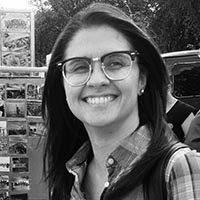
“‘Not undesirable but unnecessary’: Jewish Refugees from Nazism in Colombia (1945-1950)”
Professional Background
Lorena Cardona González is a professor in the faculty of social and legal sciences at the Universidad de Caldas (Colombia). She earned a PhD in history and an MA in History and Memory from the Universidad de la Plata (Argentina), and was a postdoctoral fellow in history at the Instituto de Investigación en Humanidades y Ciencias Sociales (IdICHS) and National Scientific and Technical Research Council (CONICET) at the Universidad de la Plata. She was also the recipient of the Max and Cecil (Steuer) Chesin/JDC Archives Fellowship, where she worked on the integration of Jewish refugees from Nazism in Colombia during the postwar period. Dr. Cardona González’s research focuses on the representations of the Holocaust in Colombia and the history of Jewish and German migration during World War II. Her master’s thesis, “Sobre ciertas cosas que no se pueden nombrar. La Representación del Holocausto en Colombia (1976-2015),” emerged from these two interests, as did her doctoral dissertation, “Una colectividad honorablemente sospechosa: Los alemanes, Colombia y la Segunda Guerra Mundial”. Dr. Cardona González also works on forms of commemoration and the political uses of the Holocaust in Colombia.
Fellowship Research
The problems encountered by Jewish migrants to Latin America did not end with the defeat of Nazism nor with the dramatic revelation of the crimes committed by the Nazi regime. Recent research has explored the continuity of discriminatory policies after the war and has shown the complex reception that Holocaust survivors received in the region. This scenario of discrimination and restriction also occurred in Colombia, where Jewish immigrants were considered “incompatible” in cultural and religious terms, particularly considering the prevalence of Catholicism in the country. At the same time, a substantial number of refugees came from eastern Europe, which seemed to associate them with Soviet communism and caused a perception that they held dangerous political ideas. Local business people also denounced as unfair and harmful to their businesses the migrants’ economic practices, including usury and peddling, thus making their entry to the country nearly impossible.
Colombia maintained selective policies related to migrants until 1948 when Legislation 161 was enacted and the requirements to enter the country “relaxed.” This favored Catholic migrants from Western Europe, which seriously affected a large number of Holocaust victims coming from this area. In terms of integration and institutional consolidation, the local—civil war—and international events of 1948 were crucial and, at the same time, devastating for the country’s Jewish community. Forced to make different requests for international aid to reestablish economic life, their pleas were confronted with the multiple interests and demands of the postwar community. Dr. Cardona González will consider three variables as she analyzes the migration of Jewish Holocaust survivors in the Colombian postwar context, on both local and international levels: the problem of refuge, antisemitism, and political violence.
